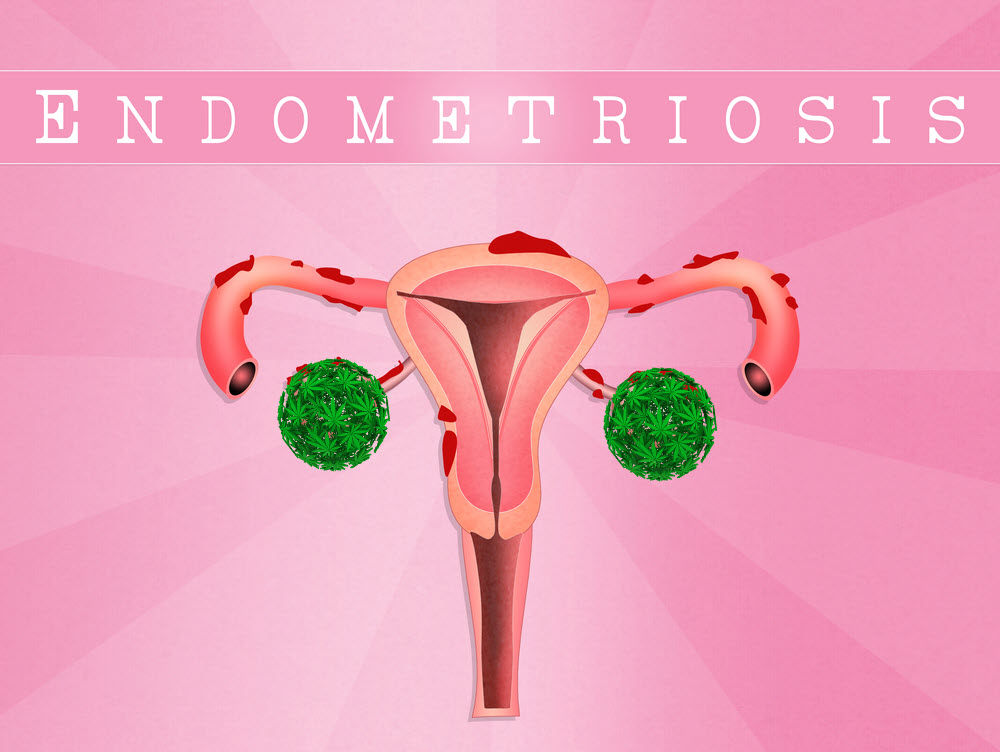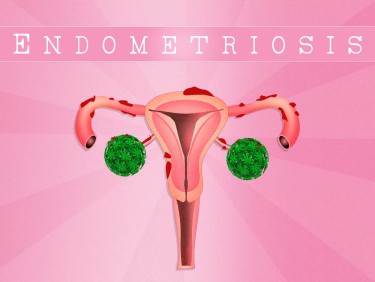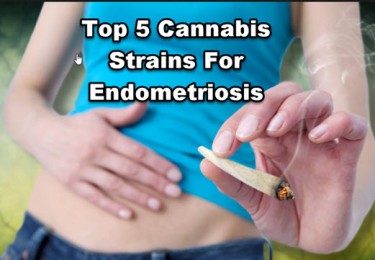Cannabis News
Why Weed is the Best Thing That’s Happened to Endometrosis Patients in the Last 50 Years
Published
4 weeks agoon
By
admin

Endometriosis is one of the most pain conditions affecting women worldwide.
When endometriosis occurs, the endometrial tissue which normally grows inside the uterus, grows outside of it. As a result, it can attach itself to other reproductive organs in the area. In extreme cases, endometriosis can reach far beyond the reproductive area and cause serious pain and damage. The symptoms of endometriosis include sharp period pains, fatigue, pain during sex, infertility, heavy periods, and much more.
According to the World Health Organization, around 10% of women who are in reproductive age, have endometriosis. Unfortunately, there is no known cure, though several protocols can be integrated into a patient’s lifestyle to mitigate or reduce symptoms. Some common medications used for reducing the symptoms of endometriosis include birth control pills, hormonal injections, patches, and intra-uterine devices (IUD), to name a few. However, these may affect a woman’s chances of getting pregnant, or make infertility even worse since endometriosis can also affect fertility.
Thankfully, more women are finding success with lifestyle changes and integrating natural treatments to treat endometriosis. Along with regular exercise, weight loss among overweight women, and healthy habits, cannabis has been shown to be helpful treating this dreaded disease.
What Studies Are Saying
There are more studies than ever, too, proving the efficacy and benefits of cannabis for women suffering from endometriosis. In a recent study out of Germany, researchers analyzed survey data from more than 900 endometriosis patients to determine how, if any, the symptoms are impacted by cannabis.
A significant percentage of the 900 respondents acknowledged using marijuana, and most of them said that it was beneficial in helping with symptoms. “Seventeen percent of the respondents used cannabis flower strains or cannabis-related products as a self-management method,” said the researchers. “Cannabis was rated as the most effective self-management strategy to reduce symptom intensity (self-rated efficacy 7.6 out of 10). Additionally, ~90 percent of the participants were able to decrease the pain medication intake,” explained the researchers. They also noted that the participants observed the most significant benefits from cannabis in their sleep, menstrual pain, and non-cyclic pain in that order. Because of this, it’s become clear that cannabis can greatly help improve quality of life in these areas, which are otherwise affected by symptoms of endometriosis.
It’s important to note that the investigators also acknowledge that existing studies on cannabis for endometriosis is limited, yet there is an increasing quantity of studies pointing to a growing trend of women self-medicating with cannabis for this condition, and seeing success!
“The use of cannabis has a significant impact on the overall well-being and quality of life of women with endometriosis,” they concluded. “The study indicates that there is a significant interest and demand for additional therapeutic options, and cannabis can potentially become an important part of a multimodal therapy approach for treating endometriosis,” said the study.
Another study from Australia, whose results were published earlier this year, found similar results. The data, which was published in the journal, Obstetrics and Gynecology, were taken from 192 women who were polled by Australian researchers regarding their history of marijuana consumption and endometriosis symptoms.
According to the findings, 63% of the poll respondents were given doctor’s authorization letters for using cannabis-based medications. In Australia, physicians are legally allowed to recommend cannabis use for patients who have had no luck treating specific conditions using conventional prescription drugs. In the study, most women were using THC-dominant marijuana products and they reported improvements when it came to sleep, pain, nausea, and anxiety.
“This study found that THC-predominant CBMPs [cannabis-based medicinal products] are commonly prescribed to Australians with endometriosis,” said the authors. “Given major issues with symptom management and the self-reported reductions in pain and other symptoms, improving access to medicinal cannabis for this population is important and timely,” they said.
Why Cannabis Works So Well For Endometriosis
These studies and tons of anecdotal evidence available on the internet show that cannabis is indeed safe and effective for treating endometriosis. After all, cannabis interacts with the endocannabinoid system (ECS), which plays an important role in helping us regulate pain, inflammation, and our immune response – all of which are impacted by endometriosis.
While there are many symptoms that cannabis can help with, one of its greatest successes has been in reducing pain. Women have found success using both high-CBD and high-THC products to reduce the severe pain that accompanies endometriosis. Likewise, the pain, discomfort, and cramping can make it difficult to get some decent sleep; marijuana can help with that too!
In addition, marijuana can help women’s bodies balance out hormones, since the endocannabinoid system also plays a role in hormone regulation.
Furthermore, women can choose from a variety of products to help treat endometriosis. While smoking or vaping is always a popular choice, there ae also edibles, topical creams, oils, beverages, and tinctures.
Conclusion
When looking to treat endometriosis, remember that there is no miracle cure out there. Marijuana certainly helps, but it’s not a one-size fits-all approach. Please remember to consult with a medical professional, and keep in mind that you will always have the best results if you also address other lifestyle factors as mentioned earlier.
Maintaining a healthy weight, avoiding processed and sugary food, and regular exercise are all key factors to mitigating the symptoms of endometriosis. Add cannabis to the mix, and you can now look forward to regaining a better quality of life.
MARIJUANA STRAINS FOR ENDO PATIENTS, READ ON…
You may like
-


Veterans With PTSD Are Given A Little Hope
-


FDA Approves Landmark Clinical Trial for Veterans with PTSD and Smoking Cannabis
-


Oregon Cannabis: Get Your OLCC Renewal or New Application in Before December 5th
-


How Organic Hemp Rolling Papers Affect the Flavor and Smoking Experience
-


Emerald’s 2024 Holiday Gift Guide
-


What Your Method of Cannabis Consumption Says About you
Cannabis News
FDA Approves Landmark Clinical Trial for Veterans with PTSD and Smoking Cannabis
Published
16 hours agoon
December 3, 2024By
admin

For decades, veterans and civilians alike have turned to cannabis to manage their PTSD symptoms, often finding relief where traditional pharmaceuticals fell short. Walk into any VA hospital, and you’ll likely find patients being prescribed a cocktail of medications – SSRIs like sertraline and paroxetine, anti-anxiety drugs like alprazolam, sleep aids like zolpidem, and sometimes even antipsychotics. Yet many vets report these medications leave them feeling like zombies, trading one set of problems for another.
As someone who’s been following cannabis policy for years, I’ve watched countless researchers bang their heads against the wall trying to study this plant’s potential for PTSD treatment. The roadblocks have been numerous and, frankly, ridiculous. Despite overwhelming anecdotal evidence and desperate pleas from the veteran community, getting approval for clinical trials involving smokable cannabis has been about as easy as teaching a cat to swim – theoretically possible, but practically impossible.
That’s why the FDA’s recent approval of a landmark clinical trial has caught my attention. After three years of back-and-forth negotiations, the Multidisciplinary Association for Psychedelic Studies (MAPS) finally got the green light to conduct a Phase 2 study examining smoked cannabis for PTSD in veterans. This isn’t just another sterile laboratory experiment – it’s designed to reflect real-world usage patterns, something we’ve desperately needed in cannabis research.
In this article, we’ll dive deep into what this study means for veterans, the cannabis community, and the future of federal legalization. We’ll explore why this research is groundbreaking, how it might reshape our understanding of cannabis as medicine, and what it could mean for the millions of Americans living with PTSD.
Let’s dive into what makes this study so groundbreaking. MAPS isn’t just dipping their toes in the water – they’re diving in headfirst with a comprehensive Phase 2 clinical trial involving 320 veterans suffering from moderate to severe PTSD. What makes this study particularly fascinating is its focus on “real-world” cannabis use, allowing participants to self-titrate their dosage of high-THC flower within certain limits.
Now, for those who aren’t familiar with the FDA’s clinical trial phases, let me break it down. Phase 1 typically focuses on safety and involves a small group of people. Phase 2 – where this study sits – is where things get interesting. It’s designed to test both effectiveness and side effects, involving a larger group of participants. If successful, Phase 3 would follow with an even larger group, and finally, Phase 4 would monitor long-term safety after FDA approval.
The fact that this study reached Phase 2 is a big deal, folks. It means we’ve cleared the initial safety hurdles and are moving into territory that could actually influence medical policy. But what really sets this research apart is its focus on smokable flower. This wasn’t an easy win – MAPS had to fight through five partial clinical hold letters from the FDA just to get here.
Why does the smoking aspect matter so much? Well, think about it – most FDA-approved medications come in neat little pills or carefully measured doses. Smoking cannabis? That’s been a major sticking point for regulatory agencies. By including smoking as a delivery method, this study acknowledges how most veterans actually use cannabis in the real world. No fancy pharmaceutical extracts or synthetic compounds – just the plant in its most basic, smokable form.
The implications here are huge. If this study demonstrates positive results, it could fundamentally change how we approach cannabis as medicine. It might force regulatory bodies to reconsider their stance on smokable cannabis, potentially opening doors for more research and eventual federal approval of whole-plant medicine. This could be particularly significant for veterans, who often prefer smoking or vaping cannabis for its rapid onset and ease of dose control.
But perhaps most importantly, this study could provide the hard scientific evidence we’ve been missing. While thousands of veterans have testified about cannabis helping their PTSD, the lack of controlled clinical trials has been a major roadblock in changing federal policy. A successful outcome here could be the wedge we need to finally crack open the door to federal legalization.
Of course, we shouldn’t count our chickens before they hatch. Clinical trials are complex beasts, and there’s still a long road ahead. But for the first time in a long while, I’m feeling optimistic about the direction we’re heading. This study could be the game-changer we’ve been waiting for in the fight for cannabis legitimacy.
Let’s talk about PTSD – a condition that affects roughly 12 million American adults annually. That’s more people than the entire population of New York City, folks. Post-Traumatic Stress Disorder isn’t just about being scared or anxious; it’s a complex psychological condition where traumatic experiences get stuck in an endless replay loop, like a scratched record that keeps skipping back to the same devastating track.
But here’s where cannabis enters the picture, and it’s fascinating how it works. Our endocannabinoid system plays a crucial role in how we process and store memories, particularly emotional ones. When someone consumes cannabis, it can help disrupt those stubborn neural pathways that keep trauma loops running. Think of it like hitting the pause button on a horror movie that’s been playing on repeat in someone’s head.
However – and this is crucial – cannabis isn’t a magic eraser for trauma. I’ve spoken with countless veterans who use cannabis, and they’re the first to tell you: the plant helps manage symptoms, but it doesn’t “cure” PTSD. Real healing requires doing the hard work of processing and integrating traumatic experiences. Cannabis is more like a helpful companion on that journey rather than the destination itself.
What makes cannabis particularly interesting in PTSD treatment is its ability to increase neuroplasticity – the brain’s ability to form new neural connections and reorganize existing ones. This is where the real magic happens. When someone’s brain becomes more “plastic,” they’re better equipped to process traumatic memories and potentially create new, healthier neural pathways.
Speaking of neuroplasticity, we can’t ignore the elephant in the room – psilocybin. Recent studies have shown remarkable promise in treating PTSD with psilocybin-assisted therapy, often producing profound and lasting changes in just a few sessions. The fact that both cannabis and psilocybin increase neuroplasticity while offering different therapeutic approaches suggests we might be onto something big in trauma treatment.
What drives me crazy is how long it’s taken to get here. We’ve known about cannabis’s potential benefits for PTSD for decades. Veterans have been telling us. Trauma survivors have been telling us. Heck, even some forward-thinking psychiatrists have been telling us. Yet we’re only now getting around to serious clinical research? It’s a testament to how prohibition hasn’t just restricted access to cannabis – it’s actively delayed our understanding of this plant’s therapeutic potential.
But hey, better late than never, right? As we move forward with studies like the MAPS trial, we’re finally starting to piece together the scientific puzzle that veterans and other PTSD survivors have known about all along. Cannabis isn’t just helping them sleep better or feel calmer – it’s potentially giving them the neurological flexibility they need to process and integrate their trauma in a healthy way.
Like most things in the cannabis reform movement, progress moves at a snail’s pace. But as frustrating as it might be, we’re undeniably moving forward. The FDA’s approval of this MAPS study, focusing on smokable cannabis no less, marks a significant shift in how our regulatory bodies view cannabis research.
The beauty of this study lies in its real-world approach. No artificial laboratory settings or synthetic cannabinoids – just veterans using cannabis the way they already do. This authenticity could provide invaluable data about how cannabis actually functions as a medicine in everyday life, not just in theory.
Let’s be real though – regardless of what this study finds, veterans and others suffering from PTSD who’ve found relief with cannabis aren’t going to stop using it. The plant has been their lifeline when traditional pharmaceuticals failed them. But positive findings could open doors for countless others who might benefit from cannabis but have been hesitant due to its federal status or lack of clinical validation.
This is particularly crucial for our veteran community. With veteran suicide rates remaining tragically high – averaging around 17 deaths per day – we desperately need more treatment options. It’s no coincidence that veteran groups have been among the loudest voices calling for cannabis research and reform. They’ve seen firsthand how this plant can offer hope where traditional treatments have fallen short.
As we await the results of this groundbreaking study, I remain cautiously optimistic. Sure, progress is slower than we’d like, but each step forward brings us closer to a future where veterans and others with PTSD can access the medicine they need without stigma or legal barriers. And for the countless individuals struggling with PTSD, that future can’t come soon enough.
Source:
www.marijuanamoment.net/fda-approves-long-awaited-clinical-trial-of-smoked-marijuana-to-treat-ptsd-in-veterans/
ARE PSYCHEDELICS JUST WEED 2.0? READ ON…
ARE MAGIC MUSHROOMS THE NEW WEED 2.0? WE ASKED THE EXPERTS!
Cannabis News
Oregon Cannabis: Get Your OLCC Renewal or New Application in Before December 5th
Published
18 hours agoon
December 3, 2024By
admin
As of this Thursday, December 5th, Ballot Measure 119 requires all OLCC licensed retailers, processors and labs to provide a signed labor peace agreement (LPA) with a bona fide labor organization, to renew or apply for an OLCC license.
In the totally avoidable, unduly compressed timeline since BM 119 passed, we have been advising our Oregon cannabis clients to renew their license applications ahead of the December 5th deadline if possible. Same deal for new applicants– get everything in before the deadline. This will allow qualifying businesses to avoid the LPA issue for another year (or maybe forever, if the courts get ahold of BM 119).
OLCC marijuana licensees are required to renew their licenses annually. Licensees are notified 90 days prior to their license expiration date that it’s time for license renewal. According to my wizard paralegal, this notice automatically posts in CAMP, which is the OLCC’s online licensing software. Specifically, a licensee will receive an “Actions Required” notification on their dashboard.
OLCC has confirmed that licenses set to expire after December 5th, will not require an LPA submission until the following year’s renewal, provided that the license has been renewed prior to the December 5th deadline. Same deal with any new license applicant. To that point, OLCC’s most recent BM 119 Bulletin is here. It answers some basic questions and contains no surprises.
OLCC also recently published its Labor Peace Agreement Attestation Form. This is a form that applicants may submit in lieu of actually filing their LPA with the Commission. Somebody asked me what the repercussions might be if they were to submit this form without having a signed LPA in place. The short answer is “don’t do that.” The longer answer is that there are many administrative rules dealing with “false statements”, “material false statements” and the submission of “false or misleading information” to OLCC. License revocation or non-renewal is a real possibility there.
For more information on this topic, the Cannabis Industry Alliance of Oregon has a guide here, and has been sending out helpful emails on its listserv (you can sign up for those here). The relevant OLCC materials are linked above, and I’ll provide links to our previous posts on this topic just below. For now, get those license renewals and applications in!
See also:
Cannabis News
Attention, Canna Companies! CTA Filing Deadline this Month
Published
2 days agoon
December 2, 2024By
admin
For anyone that has not yet met their Corporate Transparency Act (CTA) filing requirements, now is the time! The deadline for entities created or registered before January 1, 2024, is less than a month away, on December 31, 2024.
In July, we published a blog post covering questions on the CTA. The full text of that post is included below.
____________________________
On January 1, 2024, the federal Corporate Transparency Act (CTA) took effect. The CTA requires a host of both domestic and foreign entities to disclose their beneficial ownership to the Treasury’s Financial Crimes Enforcement Network (FinCEN). Compliance with the CTA is required for all businesses, including those in the cannabis industry. In this post, I’ll overview some (but not all) key requirements of the CTA, and some of the implications for the cannabis industry.
What is the CTA?
The purpose of the CTA is to combat illegal activities like money laundering by disclosure of information concerning “beneficial owners” to FinCEN. Beneficial ownership essentially means the individuals who own or control a company (more on that below). FinCEN and other domestic governmental authorities can use this beneficial ownership information in certain contexts for law enforcement purposes. Detailed FAQs on the CTA are available here.
Who must report?
Corporations, limited liability companies, and other business entities are considered reporting companies for purposes of the CTA. Certain sole proprietors may not count as reporting companies, and CTA exempts 23 classes of entities, such as governmental bodies, banks, and certain large operating companies.
Figuring out whether a business qualifies for an exemption can in some cases be complicated, and businesses can flow in and out of exemptions over time. So it’s a good idea for businesses to confer with counsel to determine whether they are compliant.
When must reporting happen?
Reporting is done by submitting an initial beneficial ownership report (BOIR) with FinCEN via an electronic portal called the Beneficial Ownership Secure System, located at FinCEN.gov, free of charge. There are some key reporting deadlines, which change based on when a company was formed (for domestic companies) or registered in the US (for foreign companies) as follows:
- Entities created or registered before January 1, 2024, must submit their initial BOIR by January 1, 2025.
- Entities registered in 2024 are required to file within 90 calendar days of their registration becoming effective.
- For registrations from January 1, 2025, onwards, the deadline is 30 calendar days post-registration notice.
CTA also has requirements to periodically update beneficial ownership information after changes occur. Failure to comply with CTA can lead to monetary penalties and even criminal liability.
What must be reported?
Reporting companies must disclose individuals with substantial control or those owning at least 25% of the entity. Substantial control includes abilities like appointing or removing directors, making significant business decisions, or other forms of major influence. For example, question D8 on FinCEN’s FAQs addresses how management companies could be considered beneficial owners of a reporting company. Sound familiar?
Disclosure itself is not dissimilar to state-level cannabis regulatory disclosures. Beneficial owners must provide their legal name, date of birth, address, and an identifying number (e.g., SSN).
How will this affect the cannabis industry?
In case you were wondering, CTA applies to cannabis businesses. There is no exemption for reporting by state-legal cannabis companies.
A lot of cannabis companies will probably get squeamish at the thought of making detailed beneficial ownership disclosures. That’s especially the case where CTA by its terms allows FinCEN to share beneficial ownership information with other federal agencies engaged in law enforcement activities, or federal agencies that supervise financial institutions.
So, expect to see owners of cannabis businesses engage in all kinds of corporate changes to obscure beneficial ownership or reduce equity and control rights to get out of disclosures. In some cases, this will not work and people will face penalties.
Also expect to see a lot of cannabis companies (and non-cannabis companies for that matter) make a good-faith effort to comply with CTA initially but fail to update information as required by law. This is just going to happen, the way CTA is set up. Whether or not people are actually penalized for late disclosures or updates absent some kind of misfeasance remains to be seen.
Conclusion
CTA is complicated and has already been a headache for many businesses – so much so that at least one group of businesses brought a challenge to its constitutionality and won. Fortunately or unfortunately (depending on how you look at it) the court did not issue a nationwide injunction but only enjoined enforcement of CTA against the specific plaintiffs. It’s possible that in different litigation or future appeals, the law itself is enjoined on a nationwide level. But for the time being, it’s the law of the land.

Veterans With PTSD Are Given A Little Hope

FDA Approves Landmark Clinical Trial for Veterans with PTSD and Smoking Cannabis

Oregon Cannabis: Get Your OLCC Renewal or New Application in Before December 5th

How Organic Hemp Rolling Papers Affect the Flavor and Smoking Experience

Emerald’s 2024 Holiday Gift Guide

What Your Method of Cannabis Consumption Says About you

DEA Hearings – Yesterday’s (12/2/2024) Livestream – 1:36

Keep it Lowkey with Discreet Cannabis Products

Can CBD Keep Cats From The Christmas Tree
Pennsylvania Lawmakers Announce New Marijuana Bill To Catch Up With Neighboring States That Have Already Legalized

Distressed Cannabis Business Takeaways – Canna Law Blog™

United States: Alex Malyshev And Melinda Fellner Discuss The Intersection Of Tax And Cannabis In New Video Series – Part VI: Licensing (Video)

What you Need to Know

Drug Testing for Marijuana – The Joint Blog

NCIA Write About Their Equity Scholarship Program

It has been a wild news week – here’s how CBD and weed can help you relax

Cannabis, alcohol firm SNDL loses CA$372.4 million in 2022

A new April 20 cannabis contest includes a $40,000 purse

Your Go-To Source for Cannabis Logos and Designs

UArizona launches online cannabis compliance online course
Trending
-

 Cannabis News2 years ago
Cannabis News2 years agoDistressed Cannabis Business Takeaways – Canna Law Blog™
-

 One-Hit Wonders2 years ago
One-Hit Wonders2 years agoUnited States: Alex Malyshev And Melinda Fellner Discuss The Intersection Of Tax And Cannabis In New Video Series – Part VI: Licensing (Video)
-

 Cannabis 1012 years ago
Cannabis 1012 years agoWhat you Need to Know
-

 drug testing12 months ago
drug testing12 months agoDrug Testing for Marijuana – The Joint Blog
-

 Education2 years ago
Education2 years agoNCIA Write About Their Equity Scholarship Program
-

 Cannabis2 years ago
Cannabis2 years agoIt has been a wild news week – here’s how CBD and weed can help you relax
-

 Marijuana Business Daily2 years ago
Marijuana Business Daily2 years agoCannabis, alcohol firm SNDL loses CA$372.4 million in 2022
-

 California2 years ago
California2 years agoA new April 20 cannabis contest includes a $40,000 purse





